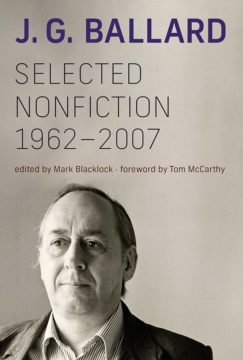Joanna Kavenna at Literary Review:
 What the hell is reality and how do we distinguish it from fiction? Who decides? Furthermore, if those who decide the allocations of the real and unreal are cruel, mad or colossally wrong, what then? These are the sorts of questions to which J G Ballard returns again and again in his fiction and non-fiction. His writing career spanned more than five decades. His work ranged from short stories published in New Worlds and Science Fantasy in the 1950s through to anti-realist novels exploring malfunctioning societies, psychological extremity, fragmentary modernity and technomania: from Crash! (1973), Concrete Island (1974), The Unlimited Dream Company (1979) to Rushing to Paradise (1994) and others. In later novels, such as Cocaine Nights (1996), Super-Cannes (2003) and Kingdom Come (2006), Ballard focused intently on savage anomie among the upper-middle classes, devising his own genre of bourgeois noir. Like Philip K Dick – who defined himself as ‘a fictionalising philosopher’ – Ballard deployed the creaking conventions of the novel to pose deep questions about reality, truth and the relationship between the inner mind and the external world. In his introduction to the French edition of Crash!, Ballard wrote: ‘The most prudent and effective method of dealing with the world around us is to assume that it is a complete fiction.’
What the hell is reality and how do we distinguish it from fiction? Who decides? Furthermore, if those who decide the allocations of the real and unreal are cruel, mad or colossally wrong, what then? These are the sorts of questions to which J G Ballard returns again and again in his fiction and non-fiction. His writing career spanned more than five decades. His work ranged from short stories published in New Worlds and Science Fantasy in the 1950s through to anti-realist novels exploring malfunctioning societies, psychological extremity, fragmentary modernity and technomania: from Crash! (1973), Concrete Island (1974), The Unlimited Dream Company (1979) to Rushing to Paradise (1994) and others. In later novels, such as Cocaine Nights (1996), Super-Cannes (2003) and Kingdom Come (2006), Ballard focused intently on savage anomie among the upper-middle classes, devising his own genre of bourgeois noir. Like Philip K Dick – who defined himself as ‘a fictionalising philosopher’ – Ballard deployed the creaking conventions of the novel to pose deep questions about reality, truth and the relationship between the inner mind and the external world. In his introduction to the French edition of Crash!, Ballard wrote: ‘The most prudent and effective method of dealing with the world around us is to assume that it is a complete fiction.’
more here.
